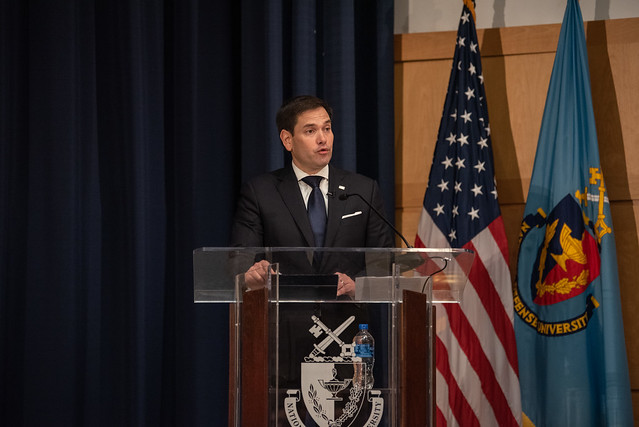Senator Marco Rubio speaks at National Defense University on the need for a ‘pro-American industrial policy’ to counter China.
A New Nationalism

Foreign threats demand a muscular domestic response.
With our natural resources, our productive capacity, and the genius of our people for mass production we will…outstrip the Axis powers in munitions of war.
Franklin Roosevelt, Message to Congress, June 10, 1941
War, or the threat of war, should awaken nations from their dogmatic quarrels. So too should concentrated economic threats and assaults on our political system from unfriendly powers. It is not so much a matter of good global intentions but the embrace of hard-headed national interests, not only in the realm of energy and manufacturing, that will be key in responding to the autocratic challenge.
In the end, it’s only the nation state—in alliance with other similarly minded states—that can stand up to the threats now coming from our primary adversaries, China, and Russia. NATO does not build planes and failed to counter Russian threats; the UN has not exactly stamped out aggressive wars. Meanwhile the global economic hegemons have backed policies on energy and manufacturing that have made our autocratic enemies, and their allies like Iran, stronger.
Fortunately, America has revived itself before, albeit often later than would have been ideal. We freed ourselves from Britain through Hamilton’s embrace of industrial development; Lincoln’s development of credit systems, the Homestead Act, and the development of industries proved critical to defeating the slave economy of the south. Massive American production was critical in defeating Nazism and, over the ensuing four decades, under both parties, the United States managed to innovate and out produce the Soviet industrial state.
To be effective at countering that vast effort, a new American nationalism must transcend Donald Trump’s often hyperbolic “America First” rhetoric.We are fighting a primarily economic war, not against ideological opponents like the USSR or Mao’s China, but against leaders strategically motivated by imperial revanchism. In countering these autocratic moves, we cannot count on the United Nations, the European Union, or the globalist grandees of Davos. The current challenge can only be met by a national response on every level—from our increasingly weakened military, to our industrial and agricultural establishment—as well as an embrace of America’s uniqueness and historic mission.
Successful nationalism lies in tapping the power of our productive economy—real products, not just digital ones—as occurred under Franklin Roosevelt and successive presidents. America’s rise to global predominance in the last century, and its creation of a vibrant middle class, had its roots, notes economic historian Robert Gordon, in great investment in physical infrastructure and production. In contrast, our current focus on digital technology and social media has resulted in a slow and diminished productivity and growing social inequality. This has been made worse as by what one analyst describes as “the transformation of disruptive tech companies into rent seeking monopolies.”
Rather than amplify social media and oligarchic privilege, we need to realize that it will be largely in the “real economy” that the struggle will be determined. This starts, particularly in reference to Russia, with restoring our control of our own energy supplies. The “net zero” climate policies adopted by President Biden and most of his party have worked to reduce energy investment, with new regulations making it harder to build new fossil fuel plants, which has contributed to soaring energy prices. In this he has been buttressed by our corporate elite, which has taken the “net zero” pledge and even now frets that the invasion of Ukraine may distract us from an obsessive focus on renewable energy sources.
Russia’s adventurism may be passionately denounced by the virtue signalers from Wall Street and the New York Times to Hollywood, but the decisive answer to the Asian partnership rising against the woke West will come from the workers and managers of west Texas, the Great Plains, the logistics hubs on the West Coast, and the industrial Midwest. Right now, the greens basically offer little more than permanent economic dislocation. The green aristocracy’s plans to cover much of the countryside with solar panels and windmills are bitterly opposed by residents who might not see much advantage in scarring their backyards to salve the consciousness of the global Greta Thunbergs.
In terms of our national interest China’s industrial expansion presents a far bigger threat to America’s future than Russian oil or Putin’s nastiness. Throughout the period between 2004 and 2017, our reliance on Chinese inputs doubled, costing, according to the Economic Policy Institute, as many as 3.7 million jobs since 2000. We saw the wages of dependency during the pandemic, when we could not even get basic medical supplies.
China is the senior partner in the emerging authoritarian duopoly, but its rise is also fueled increasingly by Russian oil and gas, including a new gas pipeline. Yet sadly, the biggest obstacles to America’s nationalist revival comes from the very people—top corporate executives—who once had an abiding self-interest in the prosperity and political support of the populace.
Our industrial decline reflects in large part deliberate strategy pushed by Wall Street as well as consultants who assured companies that shifting production to China was safe and profitable, at least for the short run. Tom Mahoney, a principal figure in Mforesight, a firm that studies and advocates for manufacturing innovation, notes that in the shift away from production, “McKinsey is the great evil empire, along with anyone with an MBA.”
McKinsey’s admonition to abandon American production reflects the profoundly de-nationalized globalism of the American establishment. Although the antics of Putin and Xi may make corporate America somewhat less enthusiastic about our current springtime for dictators, most U.S. firms seem unwilling to unplug from their autocratic attachments. Just last year saw the signing of Apple’s astounding $275 billion deal with Xi’s regime, an agreement that grants China continued control of production while selling off advanced technology to the autocratic regime. Wall Street figures like Michael Bloomberg, Ray Dalio, Jamie Dimon of J.P. Morgan and Blackrock’s Larry Fink, seem to see no contradiction between their craven progressive mutterings at home and China’s brutal repression in Sinkiang or Hong Kong—not to mention the Middle Kingdom’s greenhouse gas output, which totals more than the rest of the developed world combined.
Fortunately, America is more than the sum of Apple, Google, Blackrock, or J.P. Morgan. A return to greater self-sufficiency has wide support from Americans. The Biden administration may have rejected Trump’s blustery approach but it has happily adopted some of his “made in America” policies. The White House has announced plans to bolster U.S. industrial production under its “Build Back Better” rubric and has expanded “buy American” government procurement programs.Both parties now include factions that favor more robust efforts to meet China’s mounting challenge in science and technology, such as the U.S. Innovation and Competitiveness Act, which passed the Senate by a wide margin.
The success of “operation warp speed” in combating the pandemic shows that some form of government cooperation with private business can be effectively deployed here. You certainly don’t have to employ a top-down federal version of the USSR’s Gosplan to promote domestic industry. It’s not an embrace of nineteenth century mercantilism if you seek to protect our markets from countries like China, which systematically seek to restrict market access with the goal of replacing U.S. products with their own. Leveraging market access in this way may violate the neoliberal orthodoxy dominant during the “post-historical” three decades after the Cold War but when powerful countries like China choose to employ classic national development techniques like state-owned corporations, subsidies, tariffs, and barely enforced intellectual property rights, the United States needs to respond in kind to protect its interests.
The good news lies not with our elites or the current political leadership but with Americans, and their ability to rise to challenges. Our business leaders may be indifferent to our national fate but Americans—although they are less willing to die for their country than earlier generations—remain far more patriotic about their country’s virtues than in any European country and say they would pay at least somewhat higher prices for domestic goods. Even now, the green grandees still oppose boosting fossil fuel energy supplies but Americans, overwhelmingly, support greater oil and gas production even if they support expanded renewables as well.
A return to focus on the productive economy will no doubt be opposed by many progressives, as well as tech and financial oligarchs and among libertarian justifiers, some of whom seem to think that just letting capitalist moguls be themselves will stop rivalrous autocracy in its tracks. But a more nationalist left also could be in the offing. Long hostile to American power, some on the left now embrace economic nationalism, notes the left-leaning American Prospect, not as Trumpian nativism but “mainstream.” As in Britain’s Labour Party, some Democrats are even calling for a bigger defense budget.
The notion of a national response may be seen as heretical, to both traditional conservatives and many progressives, but conforms to deep strains in American history, starting with Hamilton, the nation’s economic architect. As in his times, the challenge to our economy and political values can only be met by a national response on every level. Ultimately, America can meet the challenges posed by the autocratic duopoly. But this can only occur if there’s an emergence of a new national spirit, one that reflects our diversity and evolving society, but retains faith with our national experiment.
The American Mind presents a range of perspectives. Views are writers’ own and do not necessarily represent those of The Claremont Institute.
The American Mind is a publication of the Claremont Institute, a non-profit 501(c)(3) organization, dedicated to restoring the principles of the American Founding to their rightful, preeminent authority in our national life. Interested in supporting our work? Gifts to the Claremont Institute are tax-deductible.
Detractors of nationalism indulge in dreamcasting over statesmanship.
The conditions for success simply no longer exist.



